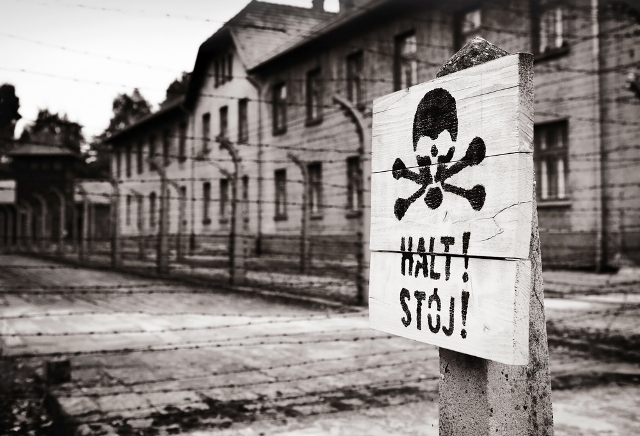The Polish Senate voted to outlaw references to “Polish death camps,” taking the controversial bill a step forward.
By: World Israel News Staff
The Polish Senate on Wednesday night approved a bill that prohibits any references to Polish involvement in the Holocaust.
The bill was approved in a 57-23 vote, with two abstaining. The bill prohibits describing Nazi death camps in Poland as Polish, and sets fines or a maximum three-year jail term as punishment.
After receiving the approval of the Polish parliament over the weekend, the bill now awaits the signature of Polish President Andrzej Duda to become law.
The move angered Israelis across the political spectrum and elicited much criticism from groups around the world.
The approval of the bill comes just days after Prime Minister Benjamin Netanyahu spoke by telephone with Polish Prime Minister Mateusz Morawiecki and the two agreed that teams from both countries would open an immediate dialogue in order to try to reach an understanding regarding the legislation.
This vote signals that Warsaw has ignored this agreement.
Member of Knesset (MK) and former Foreign Minister Tzipi Livni called the Polish vote “a double spit in Israel’s face.”
“They promised and made an agreement with Israel’s prime minister and then ignored it and voted,” she stated.
The vote also comes after the US on Wednesday attempted to postpone the vote on the controversial bill.
US State Department spokeswoman Heather Nauert stated the US understands that phrases like “Polish death camps” are “inaccurate, misleading, and hurtful” but voiced concern the legislation could “undermine free speech and academic discourse.”
“We are also concerned about the repercussions this draft legislation, if enacted, could have on Poland’s strategic interests and relationships — including with the United States and Israel. The resulting divisions that may arise among our allies benefit only our rivals,” Nauert said.
“We encourage Poland to reevaluate the legislation in light of its potential impact on the principle of free speech and on our ability to be effective partners,” she said.
Piotr Kozlowski, the deputy ambassador of Poland in Israel, was summoned on Sunday to the Foreign Ministry for discussion with the deputy director-general of the European Division and the head of the Diaspora Division.
Fear to tell my story in Poland
Netanyahu rejected the bill as “baseless,” while Israeli President Reuven Rivlin slammed it as an attempt at “fake history.”
Speaking to IDF Radio on Thursday morning, Israeli Minister of Construction said that Israel would not be able to accept this bill and called it “de-facto” Holocaust denial.
Halina Birenbaum, a Holocaust survivor, writer and poet, who has traveled many times to Poland on education trips as a witness, told IDF Radio that she will reconsider her visits out of fear that she may be arrested.
She shared that she was invited to Warsaw as a guest of honor of events marking the Holocaust, but now she is unsure she will go. “I am scared to tell the story on Polish soil,” she said.
Princeton University Professor Jan Tomasz Gross, an expert on Polish complicity in the Holocaust, previously stated that Poland’s new stance dissociating itself from the Holocaust is “a step back to the dark ages of anti-Semitism.”
The Polish-born sociologist and historian has stoked controversy in Poland with works that expose dark chapters in a wartime history that Poles are otherwise proud of thanks to a strong resistance by Poles to Nazi Germany.
The latest uproar surrounding Gross began after he asserted in 2015 that Poles killed more Jews than Germans during the war. Though the exact numbers are difficult to measure, Gross said evidence indicates that Poles killed up to 30,000 Germans during the war, at most, while they probably killed 70,000 to 90,000 Jews, but possibly more.
AP contributed to this report.


